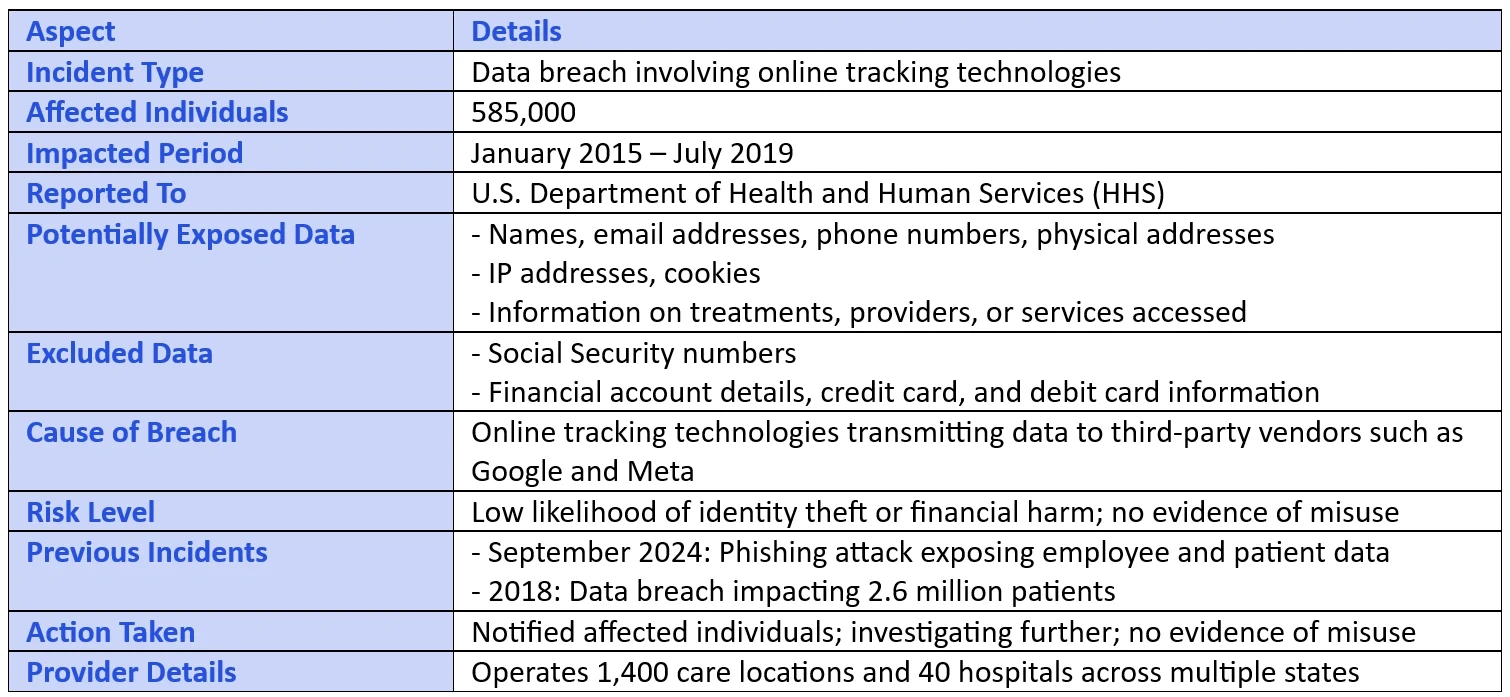Atrium Health Data Breach Affects 585,000: Patient Data Exposed via Tracking Tools
Dec 16, 2024
Atrium Health, a major healthcare provider operating over 1,400 care locations and 40 hospitals across multiple states, has reported a data breach affecting 585,000 individuals. The breach, which is believed to stem from the use of online tracking technologies, underscores growing concerns over the intersection of healthcare services and digital privacy.
Details of the Breach

The breach, as disclosed to the U.S. Department of Health and Human Services (HHS), likely involves online tracking technologies embedded in Atrium Health's patient portals, MyAtriumHealth and MyCarolinas. These tools, present between January 2015 and July 2019, were initially implemented to enhance user experience but inadvertently transmitted sensitive user data to third-party vendors like Google and Facebook (now Meta).
In a recent notification to impacted individuals, Atrium Health explained, “These commonly used internet technologies were utilized to help operate certain features of our Patient Portal and enhance the online experience for users. We have learned that, during this time frame, these technologies may have transmitted certain personal information to third-party vendors.”
While an initial review conducted in 2022 raised no red flags, a deeper investigation this year revealed the potential exposure of personal data. Though Atrium Health could not definitively determine what information was transmitted, they are treating all users of their portals during the affected time frame as potentially exposed.
Data Potentially Exposed
Depending on individual browser configurations and user actions, the exposed data could include:
Personal Information: Names, email addresses, phone numbers, and physical addresses.
Technical Information: IP addresses and cookies.
Healthcare Details: Information on treatments, providers, or services accessed.
Atrium Health assured users that no Social Security numbers, financial account information, or credit/debit card details were involved. Furthermore, the organization emphasized that there is no evidence of misuse of the data and that the nature of the exposed information poses a low risk for identity theft or financial harm.
Ongoing Cybersecurity Challenges
This incident marks the latest in a series of cybersecurity challenges for Atrium Health. In mid-September, the organization disclosed another breach resulting from a phishing attack. Over a period of two days in April, attackers accessed employee email accounts containing sensitive information, including Social Security numbers, bank account details, and health records.
Security researchers are still seeking clarification on whether the phishing attack or the tracking technology issue accounts for the 585,000 impacted individuals reported in the latest disclosure.
A Recurring Problem
Atrium Health has faced significant cybersecurity incidents in the past, including a 2018 breach that impacted 2.6 million patients. These recurring incidents highlight the need for robust digital security measures, especially as healthcare providers increasingly adopt online tools to enhance patient care and convenience.
Next Steps and Recommendations
Atrium Health has not specified what actions it plans to take to prevent similar breaches in the future. However, patients are urged to monitor their accounts and take proactive measures to safeguard their information. These include:
Regularly reviewing privacy settings on online accounts.
Being cautious about sharing personal details online.
Staying vigilant for signs of identity theft or phishing attempts.
As cyber threats evolve, this incident serves as a stark reminder of the importance of transparency, timely notification, and strong cybersecurity protocols within the healthcare industry.
Final Thoughts
The Atrium Health breach illustrates the delicate balance healthcare providers must strike between leveraging technology to improve patient experience and safeguarding sensitive information. As the healthcare sector continues to digitize, robust security frameworks must be a priority to ensure that patient trust remains intact.
Disclaimer: ClearPhish maintains a strict policy of not participating in the theft, distribution, or handling of stolen data or files. The platform does not engage in exfiltration, downloading, hosting, or reposting any illegally obtained information. Any responsibility or legal inquiries regarding the data should be directed solely at the responsible cybercriminals or attackers, as ClearPhish is not involved in these activities. We encourage parties affected by any breach to seek resolution through legal channels directly with the attackers responsible for such incidents.






